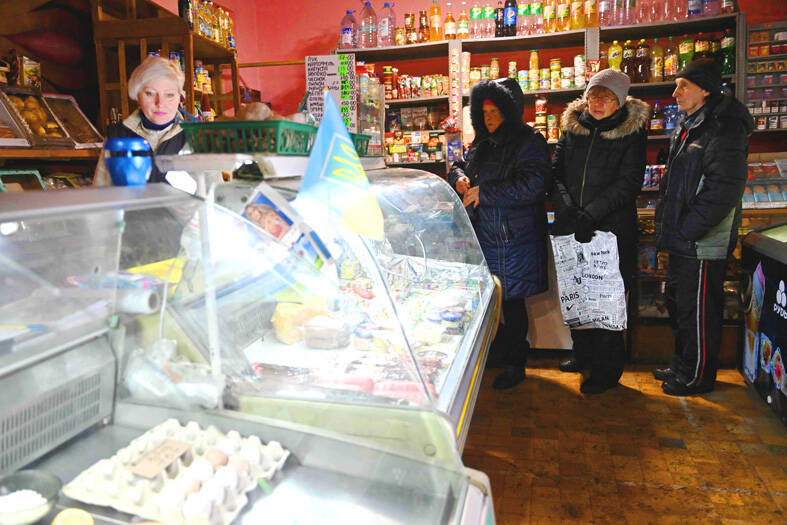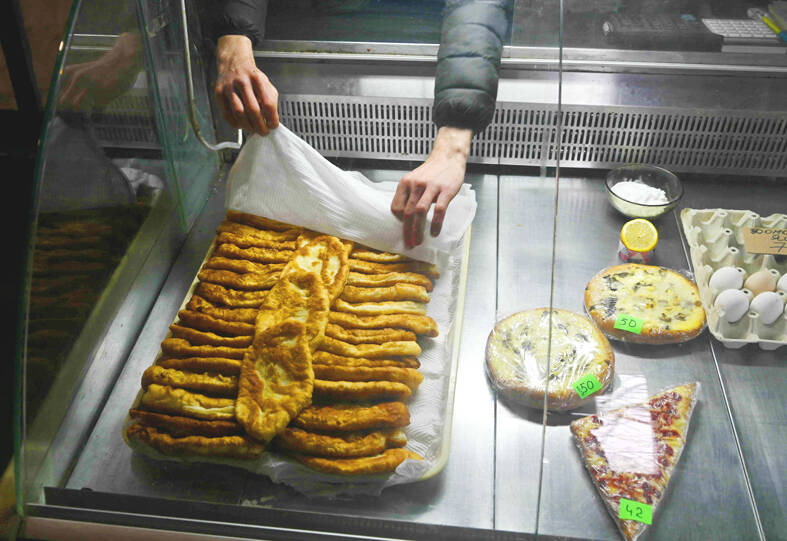With pink-painted walls, the small general store stocks a little bit of everything — from cheese to cigarettes to shampoo — providing a lifeline to local residents and soldiers.
The shop on a tree-lined road is one of the few remaining open in the heavily shelled town of Chasiv Yar near the frontline in eastern Ukraine.
Inside, shop assistant Liliya, 49, serves a stream of customers to the sound of outgoing and incoming fire.

Photo : AFP
Local people have no running water, gas or electricity.
They receive basic foodstuffs and bottles of water as humanitarian aid, but nevertheless “the most popular item is water,” store manager Artem said.
Most of those who come in are elderly, bundled up in bulky coats on a snowy day, and they are frugal with their purchases.

Photo: AFP
“Do you have cottage cheese bars for 10 hryvnia [US$0.27]? How much are romashka [chamomile] chocolate sweets? How much are the cheapest?” an older woman in a headscarf and heavy overcoat asked.
“Our village grocery store is destroyed after shelling, so I have to come here,” one man said.
“This is the last grocery store in Chasiv Yar. I come from far away, from canal area,” a woman said, referring to a massively shelled part of the town.
Store manager Artem said that no more than 500 local residents are left here, mostly older without family elsewhere.
He helps customers without cash by taking their bank cards and PIN back to a nearby town with an ATM. He also goes to a pharmacy to buy their medicines, not charging them for his time.
“Those who profiteer from the war are not very good people,” he said.
“People need to help each other. Before the war, maybe we didn’t talk to each other. Since the war started we’ve all got friendlier,” he said.
Liliya agreed.
“We help our people, even when we smile at each other. They say thanks and it’s very nice to hear it,” she said.
Artem said that about 70 percent of customers are soldiers, who come in with guns on their backs.
One set down a heavy box of bullets as he shopped.
“I buy pies, water, sausage and firelighters here,” one soldier said, smoking outside in a woolly hat, complaining that boxes of firelighters are too expensive at 90 hryvnias.
Some soldiers go outside to pay online using their army Internet. They then show a text message of confirmation.
Artem banged the counter as he talked of his hatred of the war, which has destroyed his apartment in the town.
“You were born here, you studied here, you met your love here, and the war just takes you and rips it all up,” he said.
The 30-year-old in a hooded sweatshirt and tracksuit bottoms is taking care of the shop for its owner, his aunt, who has left the town. He spends the night in another town and rushes away as soon as the shop closes at 3pm.
“It’s scary. There have been several incoming strikes in front of the shop,” he said.
Her hair neat and wearing earrings and pink lipstick, the cashier Liliya lives nearby and explained her decision to stay.
“First of all, I don’t have the money [to leave]. Also home is home,” she said.
Artem and his helper Oleksiy carry in a tray of fried potato pies, sold for 20 hryvnia each, which they have picked up from a nearby village.
The supplier refused to come all the way to Chasiv Yar and Artem had to stop his car on the way because of shelling.
Many delivery drivers “are afraid to come here,” he said, after several such vehicles were damaged.
“Not everyone wants to part with life literally in a few minutes,” he added.

To many, Tatu City on the outskirts of Nairobi looks like a success. The first city entirely built by a private company to be operational in east Africa, with about 25,000 people living and working there, it accounts for about two-thirds of all foreign investment in Kenya. Its low-tax status has attracted more than 100 businesses including Heineken, coffee brand Dormans, and the biggest call-center and cold-chain transport firms in the region. However, to some local politicians, Tatu City has looked more like a target for extortion. A parade of governors have demanded land worth millions of dollars in exchange

Hong Kong authorities ramped up sales of the local dollar as the greenback’s slide threatened the foreign-exchange peg. The Hong Kong Monetary Authority (HKMA) sold a record HK$60.5 billion (US$7.8 billion) of the city’s currency, according to an alert sent on its Bloomberg page yesterday in Asia, after it tested the upper end of its trading band. That added to the HK$56.1 billion of sales versus the greenback since Friday. The rapid intervention signals efforts from the city’s authorities to limit the local currency’s moves within its HK$7.75 to HK$7.85 per US dollar trading band. Heavy sales of the local dollar by

Taiwan Semiconductor Manufacturing Co’s (TSMC, 台積電) revenue jumped 48 percent last month, underscoring how electronics firms scrambled to acquire essential components before global tariffs took effect. The main chipmaker for Apple Inc and Nvidia Corp reported monthly sales of NT$349.6 billion (US$11.6 billion). That compares with the average analysts’ estimate for a 38 percent rise in second-quarter revenue. US President Donald Trump’s trade war is prompting economists to retool GDP forecasts worldwide, casting doubt over the outlook for everything from iPhone demand to computing and datacenter construction. However, TSMC — a barometer for global tech spending given its central role in the

An Indonesian animated movie is smashing regional box office records and could be set for wider success as it prepares to open beyond the Southeast Asian archipelago’s silver screens. Jumbo — a film based on the adventures of main character, Don, a large orphaned Indonesian boy facing bullying at school — last month became the highest-grossing Southeast Asian animated film, raking in more than US$8 million. Released at the end of March to coincide with the Eid holidays after the Islamic fasting month of Ramadan, the movie has hit 8 million ticket sales, the third-highest in Indonesian cinema history, Film